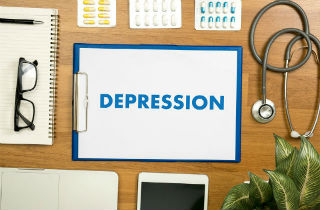Addiction and clinical depression often go hand in hand before, during and after treatment, so it’s important to learn how to cope with depression in recovery. How can you identify and treat depression in addiction recovery? We review here. And we invite your questions or comments about depression in addiction recovery at the end.
Managing co-occurring mental disorders
First, it is important to state that addiction and depression have been linked as conditions that occur together or simultaneous. In fact, the term “co-occurring disorders” typically refers to an individual who is diagnosed with co-existing mental health and substance use disorders. And co-occurring disorders are so common that particular treatment modalities have been designed to treat them. In fact, co-occurring disorders treatment is a special “niche” in the treatment of addiction.
In some cases, addictive patterns may have actually been your way of coping with depression prior to treatment, drugs or alcohol may have given you temporary relief. Those who enter treatment with the conditions of both depression and addiction frequently have a repeating pattern of staying sober for a while and then relapsing because they feel miserable. The reason for the misery is that addiction often results in multiple negative consequences, such as relationship problems, declining job performance, loss of income, poor health and low self-esteem. These conditions often seem overwhelming and impossible to overcome. Many continue to want a quick solution to their depression while undergoing substance abuse treatment, thus the difficulty in maintaining abstinence.
The dangers of depression in recovery
Clinical depression, also known as “endogenous depression” is usually chronic in nature and may be found in your family members, indicating a genetic link. Self-harm or suicide are high risk factors with clinical depression. Depression can also weaken your body and suppress the immune system, leaving you susceptible to physical aches and pains, as well as chronic illness. Bringing alcohol or drugs into the picture increases the physical and emotional health risks significantly.
How to diagnose co-occurring cases
While most of us have been through a temporary case of the blues, there’s a difference between clinical depression and situational depression. Situational depression is usually the response to a single event, like the loss of a loved one or being fired from a job. It is not chronic nor genetic in nature. Clinical depression typically lasts for at least two weeks and often longer if treatment is not administered, interfering with your ability to work, maintain healthy relationships and function socially.
You may have co-occurring mental disorders (sometimes referred to as a “dual diagnosis”) if you have a substance abuse issue and you have experienced five or more of the following symptoms:
- anxiety or feelings of hopelessness
- apathy
- chronic physical pain
- irritability
- low energy
- poor concentration
- significant decrease or increase in appetite or weight
- sleeping too much or too little; loss of energy
- suicidal thoughts or attempts
- tearfulness
Still, there is hope! Coping with depression in recovery is often personalize. So if these symptoms resonate with you, treatment options are available and can be catered to your individual needs. In fact, being diagnosed with clinical depression in addiction recovery prompts a treatment plan to treat both the depression and the addiction.
Treatment for depression in recovery
What makes co-occurring mental disorders difficult to treat is that each disorder compounds the symptoms of the other. Excessive drinking, for instance, is not going to improve clinical depression; in fact, it will likely make your depression even worse. If you are addicted to alcohol, you will likely stay depressed, and your depression will prompt you to drink more. It’s an endless circle that makes remaining clean and sober difficult.
So how are co-occurring disorders treated? Treatment for each disorder is different and will likely be merged into a single treatment plan. Treatment for co-occurring disorders sometimes includes medication such as the short term use of antidepressant medications, usually over the course of 3-6 months. Important factors toward recovery from the combination of addiction and depression include:
- Understanding the nature of your condition.
- Having confidence that recovery from a co-occurring mental disorders is possible.
- Motivating yourself to learn and adopt new coping strategies such as learning meditation techniques, cultivating hobbies, improving social skills and building a strong support network of family and friends
- Developing new attitudes and new ways of thinking.
Questions about depression in addiction recovery
Do you still have questions about depression and addiction? Please leave your questions in the comments section below. We’ll do our best to respond to you personally and promptly.









Related Posts